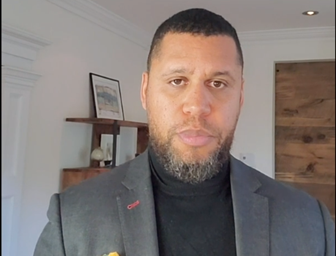Watch the French version/Visionner la version française
Watch Olivier Laquinte's video:

"Hello to the both of you,
As you already know, from seeing me since you were born, I am an entrepreneur. I built Talsom, the company that you and Rafael are so fond of, and whose apparel you so often wear. You are also aware that I, just like yourselves, belong to a visible minority. I grew up with your grandmother in Greenfield Park, just a few blocks away from where we live today. At the time, it was a pretty homogenized neighbourhood. Folks coming from visible minorities were pretty rare. I was actually around the age of six that I realized that I wasn’t “white.” It was once of those childhood memories that I have kept with me and it happened just like that. So, I asked grandma, why are my lips bigger than hers? She simply replied, it’s because your Father comes from Haiti, so your facial features are different than mine. I just said, OK, and then went on with my life.
Throughout the years, I have experienced a few episodes of racism. Honestly, nothing too bad if I compare myself to others. I have been lucky. But, in fact, I have experienced just enough racism to realize, understand and for society to confirm that, I am different. As you will see, we eventually come to grips with that reality, but were never really allowed to forget. The small injustices we endure throughout our lives become tiny little injuries that leave little scars. And just like the ones we have on our bodies; they remind us of those times when we’ve been hurt. Whether it was out shopping, At a hotel, on the bus or at school.
You know, there are several hurdles to clear when trying to start a company, and immigrants have more to deal with. From my point of view, there are three specific points that immigrant entrepreneurs have to face. First, it’s their lack of network. Second, it’s the understanding of social norms in our culture. And finally, it is the physical difference that singles them out as a minority.
The first two points are particularly true for first-generation immigrants. When they arrive in Canada, they often don’t have anyone. Who do you turn to for financing? Where do you look for your first clients or employees? They just don’t have a network or track record or any local points of reference.
The same is true for social norms and adapting to our local business culture. There are so many different cues and habits that we’ve grown accustomed to that are specific to Québec and Canada. And without realizing it, they shape our relationships and can have a major impact on our first impression. Take, for example, the ‘tutoiement’ or using pronouns to refer to people. This is rather specific to Québec. It allows us to quickly create a sense of familiarity with folks we meet, but it's unique to our culture.
You and I should consider ourselves fortunate. I am from the second generation and you are a product of the third. It was really Grandpa who had to relearn everything when he left Haiti in the early 70s. However, we still have the responsibility of showing generosity to others. Actually, to be generous with our time.
I still have a long way to go before I can call myself a great entrepreneur or successful businessman. Nevertheless, I have still acquired a certain amount of experience through the years; an experience that I commit myself to share with people when they reach out to me, especially if they are immigrants. I have a rule, never to refuse to sit down for a meeting or for a coffee to talk with someone. If you follow my footsteps, I hope, and actually, I trust, that you will do the same. Because, by behaving like that, we are giving an opportunity to someone to build their network and better understand the customs and how we work. The value of even a short conversation should never be underestimated, because by accepting to meet people, we’re sending them a message that we’re just not accepting them, we respect them.
Finally, of course, there is the question of physical difference. Again, we’re lucky to be living in Canada in this area. Mentalities have evolved quite a bit, but there is still a long way to go. To get there, I actually think that the best tool we have is a curiosity because it demonstrates our interest in others, and it helps us foster understanding. You know, what is a kirpan? Why do you braid your hair like that? I’ve seen a shirt like that being worn by Nelson Mandela, where’s that from? Those are the questions that can be door openers to conversations that can help our mentalities progress.
Immigrants and visible minorities have these additional challenges that they need to overcome. But we all have the power to help them face those challenges, by listening to one another and sharing a little bit of our time with them.
I am trying my best to do my part and I am confident that, in time, you will do the same."
-----
Additional Resource: Read this McKinsey & Company article "What I learned from a conversation with John Lewis"
-----